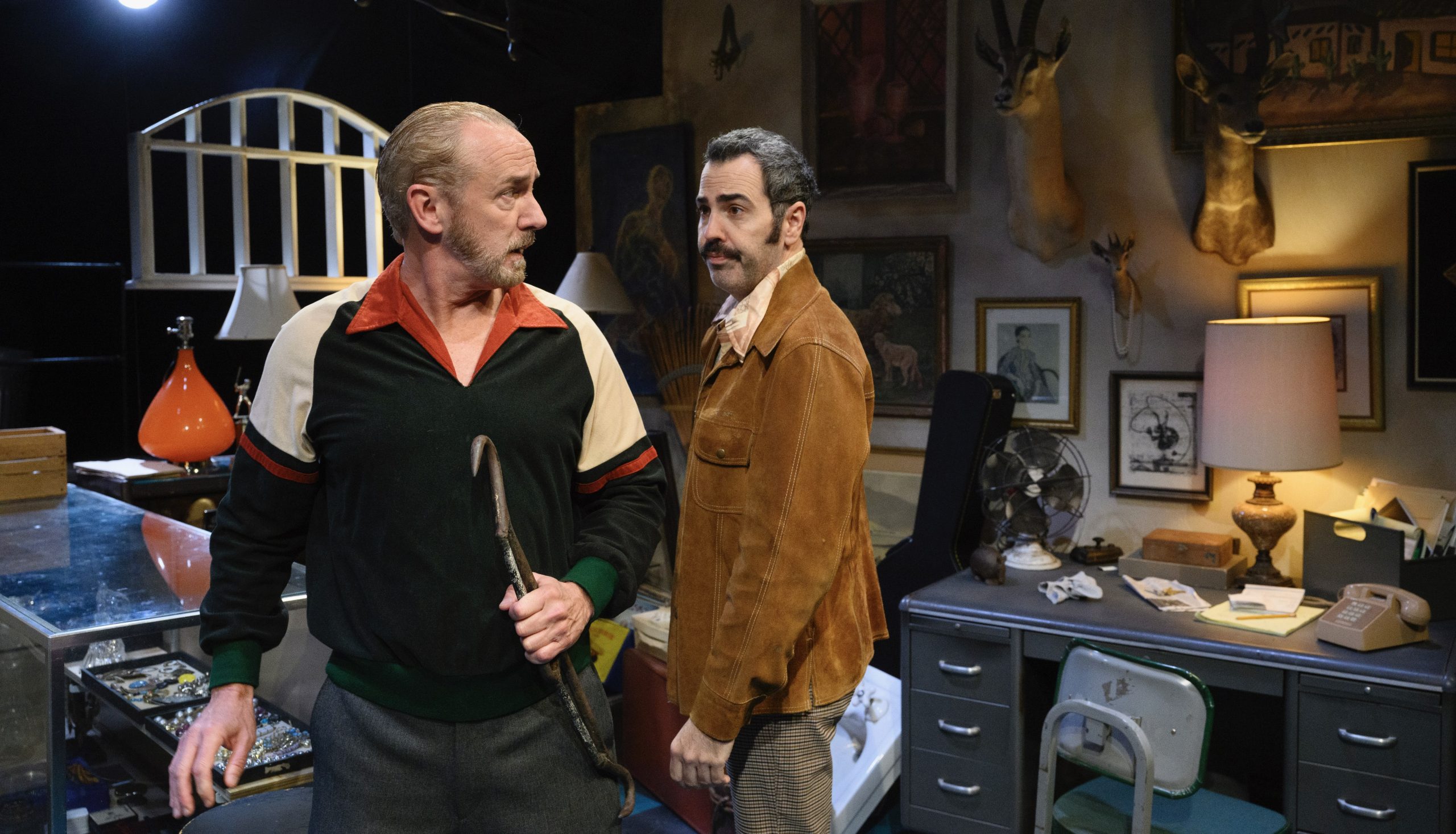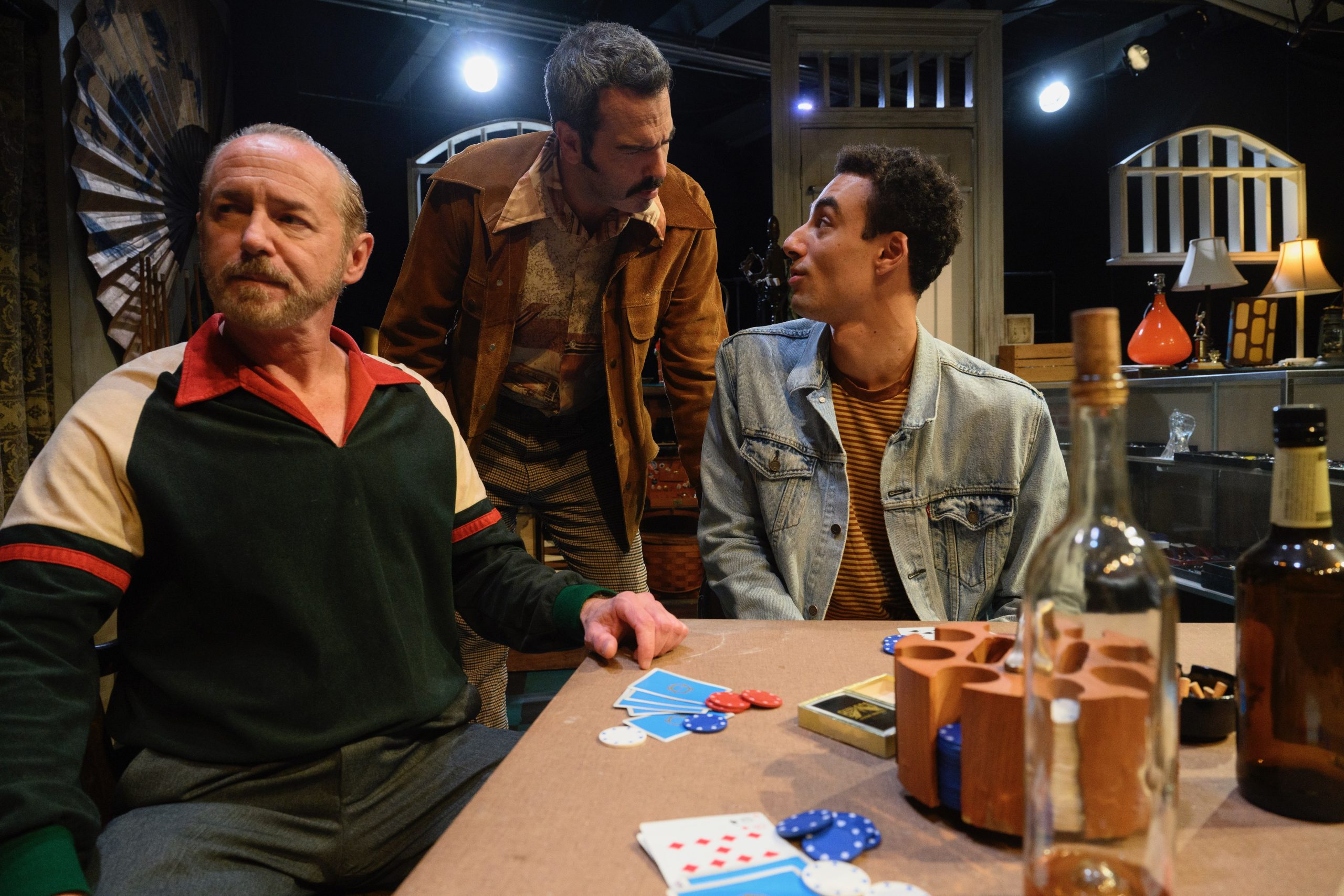The Comedy (and Tragedy) of Fucking Things Up: ‘American Buffalo’ at barebones
- Like
- Digg
- Del
- Tumblr
- VKontakte
- Buffer
- Love This
- Odnoklassniki
- Meneame
- Blogger
- Amazon
- Yahoo Mail
- Gmail
- AOL
- Newsvine
- HackerNews
- Evernote
- MySpace
- Mail.ru
- Viadeo
- Line
- Comments
- Yummly
- SMS
- Viber
- Telegram
- Subscribe
- Skype
- Facebook Messenger
- Kakao
- LiveJournal
- Yammer
- Edgar
- Fintel
- Mix
- Instapaper
- Copy Link

Well, fuck that and fuck you, too, says Donny (David Whalen, L) to the dapper but ditzy Teach (Patrick Jordan) in ‘American Buffalo.’
Sometimes artificial intelligence fails. In a test conducted just now, neither the experimental AI in Google search nor the one in Bing could give a definitive answer as to how many times the f-word is used in David Mamet’s play American Buffalo. Suffice it to say it’s a fuckin’ lot.
But that’s not the point anyway. In this 19-fucking-75 play—now on stage in a riotously engaging revival at barebones productions, through December 10—we get to see how human intelligence fails. Spectacularly and self-defeatingly, in dozens of different ways. This story of small-time wheeler-dealers trying to pull off a big heist is hilarious and pathetic at the same time. The whole caper is a hoot until it turns ugly. And the barebones cast of three—highlighted by Patrick Jordan as the wannabe master criminal, Teach—does resounding justice to a tale that tells us there’s no justice for the little dogs in our dog-eat-dog world.
Jordan is the founder and artistic director of barebones. So you might think, well yeah, of course he’d give himself a chance to play one of the juiciest roles in 20th century drama. (Actors who played Teach in past versions have included Robert Duvall, Al Pacino, and Dustin Hoffman.) But come on, give the guy a break. Jordan is only trying to do good theater.
Barebones has made its mark on the Pittsburgh scene, mostly, by staging powerful new plays of the twenty-first century: plays like Taylor Mac’s Hir and Clare Barron’s Pulitzer-nominated Dance Nation, to name just two. And occasionally, for fun and context, barebones does a throwback from ‘way back—like, back in the days when people thought landline phones were the ultimate means of miscommunication at a distance.
Which happens more than once in American Buffalo. There’s a scene in which Teach says he will demonstrate how a good con artist works a con. As a teaching aid, he’s going to purposely dial a wrong number, and then show the smooth thing to say when the person answers. Except he fucks up and dials a right number, so that when he tries to excuse himself by saying he must have reached a wrong number, he’s wrong.
Got that? Hope so, because the scene is a microcosm of the fundamental screwed-upness displayed by Teach and his friends throughout the play. Classical Buddhist doctrine prescribes the Eightfold Path to an enlightened life: right understanding, right intention, right action, and so forth. What’s comical (and also tragic) in American Buffalo is that often, each of the characters gets at least one or two of these items right—such as, wanting to do a good deed for a pal. But each guy ruins it by going off the path in other respects.
Which, in itself, isn’t necessarily fatal. Very few of us manage to fire on all eight cylinders all the time. Sometimes we do the right thing the wrong way, or vice versa, yet we get by. Maybe we luck out. Maybe our lives have a built-in margin for error that allows us to come out OK, despite the missteps. The guys in the play don’t enjoy that luxury. They live at the lower end of the socioeconomic ladder. Worse, they’ve become convinced that not only does crime pay, it can actually be justified if it moves you up the scale. In an early scene, the character Donny learns that a friend might’ve stolen, not bought, a load of scrap metal for resale. No problem, says Donny: “The fact remains that it was business. That’s what business is. People taking care of themselves.”
Grand Theft Buffalo
Donny (played by David Whalen) is the CEO of a junk shop on a dilapidated back street in 1970s Chicago. The shop is crammed with second-hand stuff that returns small profits, from old lamps and costume jewelry to teddy bears and toys. But Donny is now awake to the lure of large profits. A recent upscale customer had paid him 90 bucks—about $500 in today’s money—for a single old coin, a buffalo nickel of the kind minted up until 1938.
And when you get a lot for a little, you want more. Donny figures that the 90, generous as it seemed, was a lowball number. He thinks he was suckered. Justice therefore calls. It calls him to burgle back the American Buffalo, along with the entire collection of rare and precious coins that must surely reside within the customer’s swanky home.
To execute the burglary, Donny plans to send in his youthful apprentice Bobby. That is probably a bad idea. Although Donny loves the young man—and takes delight in serving as a father-figure and mentor to him—Bobby, as played by Brenden Peifer, is tall, dark, and charming but sorta clueless. On a theft of this magnitude wiser heads should take charge.

Bobby (Brenden Peifer, R) has his heart in the right place but maybe left some of his marbles misplaced.
Enter old buddy Teach, who sells himself as the man for the job. It’s like the Bad Idea Bears from Avenue Q saying “Hey, here’s an even worse plan!” Teach has screws loose in places where some of us didn’t know there were screws. He dresses sharp (by the standards of the Seventies) and talks a dazzling game. Behind the bold veneer, however, Teach is a quavering bundle of insecurities. When he first steps into the shop, he’s raging about a minor incident at a nearby diner, where a woman apparently said something that insulted his fragile ego: “Only from the mouth of a Southern bulldyke asshole ingrate” could such foul insinuations come, he fumes. “I’m sorry, Don, I cannot brush this off. People treat me like an asshole, they are the asshole.” It’s a tirade of the type that certain political figures today would post on social media, using all caps: THEY are the asshole!!!
More ominously, Teach’s grasp of reality is tenuous. If the coin collection happens to be locked inside a safe in the customer’s abode, is Teach a skilled safecracker? No need for that, he replies. The combination to the lock must be written down somewhere—nobody in his right mind would trust himself to memorize it, would he?—and all that Teach has to do is snoop around the obvious places till he finds the slip of paper with the magic numbers. Easily done within minutes, right?
As Teach proclaims—he is fond of dispensing teachable moments—”One thing makes all the difference in the world. Knowing what the fuck you’re talking about.”
Things Fly Apart
All of American Buffalo unfolds in the junk shop. To say that the plot “thickens” would make it sound static, like a turgid pudding. It’s more like a wild cacophony of absurd emotions and silly pronouncements, with personal tensions and fired-off repartee bouncing back and forth among the three guys until the grand mess splatters the walls like an electric mixer run amuck. And yes that’s a mixed metaphor but you get the picture.
The actors are spot-on for their roles. Jordan plays Teach as if his life depended on it. David Whalen—known for playing Sherlock Holmes in numerous Pittsburgh-area productions—is perfect here as a flawed Sherlock, keenly perceptive and keeping a level head except for when it really matters. Brenden Peifer, who’s been cast against type as feckless Bobby, does an admirably low-key job of being the most magnetic presence on stage but also the loopiest.
Perhaps you’re saving your holiday theater money for A Christmas Carol or The Nutcracker. Consider diverting some nickels for this play. Gotta balance the portfolio, you know, and this one is a fucking good investment.
Closing Credits and Ticket Info
David Mamet’s American Buffalo is directed for barebones by Melissa Martin. Through December 10 in the barebones black box at 1211 Braddock Ave., Braddock. Visit barebones on the web for tickets—they’re selling fast!—and further information.
Scenic design is by Tony Ferrieri, with assistant Noah Glaister. Props are by Rikkee Lee Rose, technical direction by Eric Papineau, lighting by Andrew David Ostrowski, and sound by Andrew Michel. Patrick Jordan chose the costumes and Randy Kovitz served as fight director. The stage manager is Claire Durr.
Production photos by Jeff Swensen.
Mike Vargo, a Pittsburgh-based freelance writer, covers theater and other subjects for Entertainment Central.
Share on Social Media
- Like
- Digg
- Del
- Tumblr
- VKontakte
- Buffer
- Love This
- Odnoklassniki
- Meneame
- Blogger
- Amazon
- Yahoo Mail
- Gmail
- AOL
- Newsvine
- HackerNews
- Evernote
- MySpace
- Mail.ru
- Viadeo
- Line
- Comments
- Yummly
- SMS
- Viber
- Telegram
- Subscribe
- Skype
- Facebook Messenger
- Kakao
- LiveJournal
- Yammer
- Edgar
- Fintel
- Mix
- Instapaper
- Copy Link
Follow Entertainment Central
Sign up for the EC Newsletter
Latest Stories







